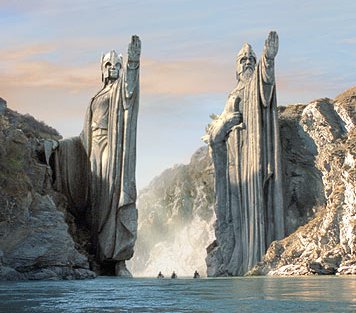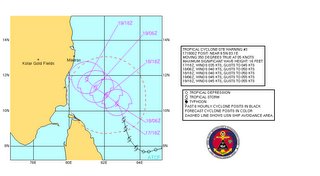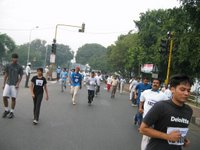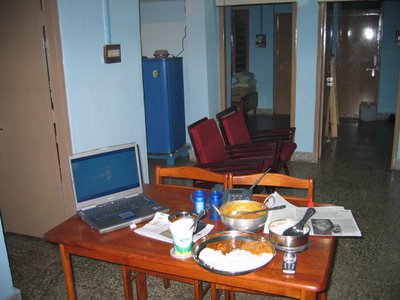We've run out of things to write home about. So we'll just regurgigate something written over a year back, and point at the blog and say, "Its alive!!". Also a chance to see if this photoblog thingumabob works in the specified manner. Notes on a
Philadelphia-Chicago-Oakland trip. Thanks are due to
- Falstaff (who, we notice today, also writes of "Of shoes -- and ships -- and sealing wax...") for the...ah...inspiration
- Veena, for effortlessly making us feel very inadequate vis a vis American experiences :).
June 13, 2004 - Concourse, 30th Street Station, Philadelphia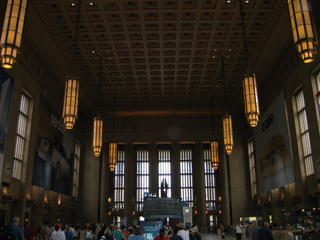 Me
Me: Excuse me, but do you know if the
Three Rivers Express starts from Philadelphia, or does it come from somewhere else?
Large, male [speaks very slowly and clearly]: This
[expansive gesture here]...is...Phi...la...del...phia.
Me:
Do you not understand the words that are a-coming out of my mouth?Of course, I didn't say that. Wish I had. I am filled with a sense of foreboding that this is a taste of things to come. Heaven knows what he took me for. Is this to be expected from all Midwesterners? Living in Massachusetts for nearly seven years hasn't prepared me for dealing with
homo sapiens midwesternus, I suddenly feel under-equipped.
Philadelphia-Harrisburg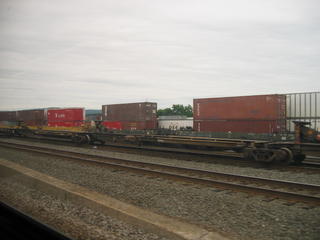
There is a girl sitting next to me, writing a letter on a brown paper bag. Of course, I catch a glimpse. "I'll miss you very much..." etc. etc. References to the possibility that recipient of said letter may end up going to Iraq. An example of someone's life being touched by the occupation...
Her name is Maggie, and she wonders why someone would photograph rolling stock. How do you explain you're a train freak? She's a high school graduate, starting pre-med in Penn State in the fall. She doesn't seem to be very excited by the thought, although she did mention that she got a scholarship ("I'm supposed to be smart, I guess...") Her siblings all went to Penn State. She likes cheesy horror flicks.
Cabin Fever,
Aliens,
Predator,
Alien vs. Predator. Of course, I promptly recommended
Jeepers Creepers. She is starting college in 2004, and we like the same cheesy movies. Maybe there is some hope after all!
Somewhere in Pennsylvania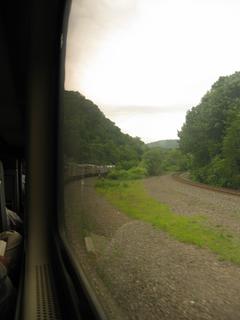
Rolling green, copses in the distance. Gray afternoon to be leaving the east coast for good. As gray as it was on the Greyhound from South Station last week. Later on, we follow the bank of a river, traveling upstream. Hills, hills, hills. The occasional smokestack.
Deer Hunter country?
Altoona, PAA number of Amish get on the train. They are so different from everyone else, I feel a strange kinship with them. Minority-minority
bhai-bhai. They speak American, when they speak English. And a kind of German (I guess) otherwise. We're traveling downhill now, towards Pittsburgh.
Next morning Toss and turn fitfully in the seat all night, never really falling asleep. Doze off in the early hours, wake up to find that all semblance of hilly country has disappeared. We’re in Indiana, or Illinois. And it is flat flat flat as far as the eye can see. But it isn’t a desolate flat – there are farms, and grain silos, and trees, and the rising sun is just beginning to scatter the pools of mist...
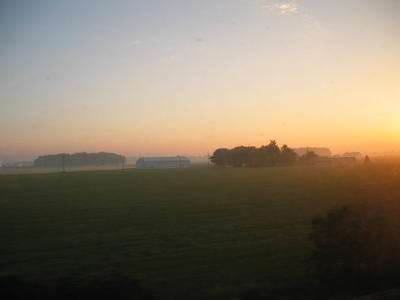 June 14, 2004 - Union Station, Chicago
June 14, 2004 - Union Station, ChicagoThe train took forever to get to Chicago. An hour late.
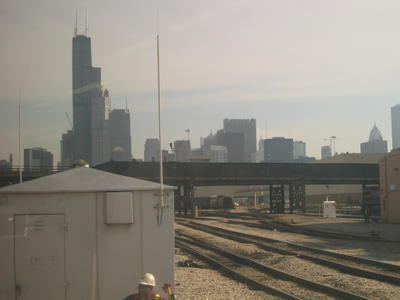
Took the
Metra to ____'s place. Shower, lunch with him and ____. Back to Union Station by Metra. The concourse in Union Station seems to be the most crowded in the world, next only to Madras Central! They announce the
California Zephyr soon enough, and a small snake of passengers detaches itself from the throng and wends its way to the Zephyr, all two storeys of it, waiting quietly on Track 26 in the sepulchral bowels of Union Station.
We have to walk past several freight cars before the passenger half of the train begins. California bound people have to get on the last car, and I stow away the backpack, take out all the books and camera, kick off my shoes and sink into the comforting navy blue-brown of the seat. A few minutes later, two pretty girls get into the same car, the cake is now iced. A few more minutes elapse, and a strict matronly conductor comes in and asks us to "Find seats upstairs." Apparently we’re too fit, and the lower level is reserved for the not-so-fit. I debate whether to show her my delicately swollen ankle, and the extra post-marathon tyres around my waist, but give up, mostly because the girls begin to leave.
Upstairs, its brighter, more crowded, and there are no window seats. Out of frustration, I plonk myself into an aisle seat, next to a lady who is large and seems grumpy (in the manner of Midwesterners). Rambha and Urvasi aren't to be seen, they're in the back somewhere.
As we leave Chicago, a number of voices from the PA system tell us
- What train we're on
- Where the bathrooms are
- Where the dining car and lounge car are
- What the next stop is
- Where the bathrooms are
- When pillows will be handed out
- They're sorry for the number of announcements
- Where the bathrooms are
- What the next stop is
- The menu
Chicago,IL - Denver, COWe're off. Sprinting (in the words of one Disembodied PA Voice) across Illinois. We stop at Galesburg, unremarkable except for being the birth of
Carl Sandburg and a rail museum.
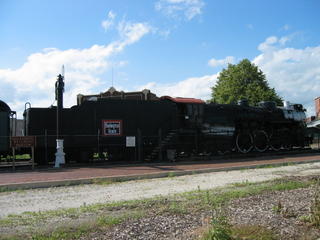
We cross the Mississippi (Verily, the Poet has said, "First Emma comes, then I come, then two asses, then I come again, and two more asses, and then I pee pee, and I come again.") near Burlington.
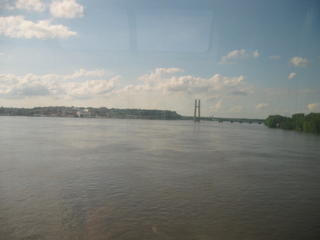
The food on board is wrapped in plastic, expensive and insipid. The lounge-cum-cafe car however, is worth the visit. The views are great. I sit and read in the fading light. Also manage to strike up conversation with the lady next to me. She's OK, returning to Omaha, Nebraska after visiting friends in Michigan. Works at the University of Nebraska, has
desis in her hospital, wants to drive to Alaska, and is not as grumpy as I'd imagined!
"Dinner" is pizza and tuna salad sandwich. Yuck. There is a movie in the lounge car afterwards. Which is nice. Sitting with fellow satiated passengers, and a cup of coffee, as the sun plays a very short symphony with the hills of Iowa, watching Gene Hackman and Ray Romano in the gathering dusk.
In the middle of the night, we pull into Omaha, Nebraska. This one place I never expected to see in my life, but here we are. Not much of a city by the looks of it. My neighbour gets off, and I rejoice at having appropriated the window seat and try to fall asleep. Alack, this is not to be. A gigantic man, in a beard and dark glasses, with walking stick, plants himself next to me. Which event
per se is not such a big problem. Other than leg space issues (
Theroux in
The Great Railway Bazaar has something to say about the conceit of the long distance rail traveler that I can't remember).
Just as I begin to doze off, neighbour starts snoring, and keeps it up with impressive volume, periodicity and continuity for the rest of the night, and into the morning. I don't get a wink of sleep and wash up at the unearthly hour of 6 a.m. Next morning, Hagrid gets off at Denver, which is a blessing.
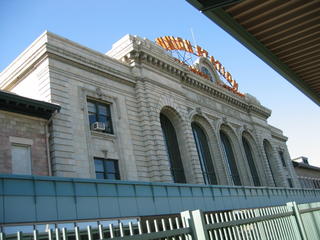
The scenery has become flatter and more arid, after we left the Mississippi behind, but far away to the west,
there be mountains! With snow glimmering on the tops. Mountains...I get muchly excited by the thought of the train going through all that. My dreams are dashed.
June 15, 2004: Denver, CO20 minute stop. A bunch of schoolchildren in T-shirts that say, "From Wyoming to San Francisco and Back!!". Were told by Disembodied PA Voice (Lugubrious) that the Moffet Tunnel is closed, and so we'll go through Wyoming on the Union Pacific line. What this turns out to mean is that we don't go through any mountains, gorges, tunnels. Instead, from dawn to dusk, there is trackless Wyoming.
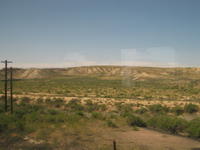
With "smoking halts" at Laramie and Green River.
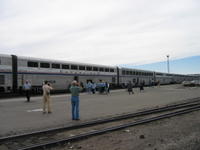
The day passes in reading, writing, and chatting with the others on board. By now it is clear that the novelty of the trip has worn off for most. The kids are antsy and even the grownups' patience is wearing thin. In the evening, we cross into Utah, and the scenery becomes more palatable. Beautiful sunset.
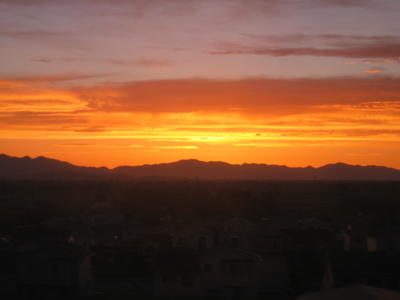
Not a whole lot to write about, and "The Great Railway Bazaar" to read means that not a lot of thinking gets done either. The entire question of what to do in the fall is still there, a gaping hole in the future. We are in the Great Basin now...
[Scheherezade saw the approach of dawn and discreetly fell silent...]NOTE: Remaining pictures are online. The train of thought, as it were, ran out of the steam of energy and inspiration at this point, and didn't pick up again till September 04, 2004, in Madras Egmore. But that tale will have to be told some other time.
